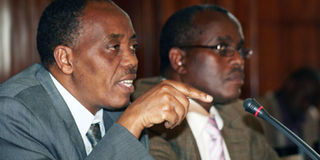Treasury pins Raila to water scandal

Finance Permanent Secretary Joseph Kinyua makes his presentation before the House Committee on Lands December 2,2010. He said Prime Minister Raila Odinga was in the know about the rot in the Ministry of Water and Irrigation when he defended minister Charity Ngilu over the corruption allegations in her docket. WILLIAM OERI
Prime Minister Raila Odinga was in the know about the rot in the Ministry of Water and Irrigation when he defended minister Charity Ngilu over the corruption allegations in her docket, Parliament’s Lands Committee has heard.
“The PM’s attention must have been drawn to the matter, otherwise he’d not have commented on something that he was not aware of,” said Treasury Permanent Secretary Joseph Kinyua.
This came as MPs tried to uncover why there were official attempts by the permanent secretary of water, Mr David Stower, to keep the national anti-graft body in the dark concerning the malfeasance in the Ministry.
Speaking in a meeting with the committee Thursday, Mr Kinyua, revealed how Mr Stower sidestepped him and opted for investigations by the Efficiency Monitoring Unit under the Prime Minister’s office.
He said that whereas he had written a letter to Mr Stower and copied it to the Kacc to investigate what appeared as credible allegations of corruption at Tanathi Water Services Board, the Water PS had replied the letter to the PS in the PM’s office, Dr Mohammed Isahakia, copied it to Mr Kinyua and left out the anti-graft body in the correspondence.
“Ideally, this breach in procedure raises questions as to why the PS (Mr Stower) did not want to write directly to me, because I was the one who initiated the discussion…for him to have deviated was not in line with the financial regulations of government,” Mr Kinyua told the committee chaired by Mr Mutava Musyimi (Gachoka, PNU).
Not Proper
He added that it was the Treasury’s mandate to supervise the expenditure of government money and ensure that all of it was properly accounted for.
“If there’s reason to suspect that something is not going on properly, then Treasury has the mandate to step in and investigate,” he said.
Upon further questioning by Mr Kiema Kilonzo (Mutito, ODM-K), Silas Muriuki (Imenti North, Mazingira) and Mr Benjamin Washiali (Mumias, ODM), the Finance PS said that the EMU should not in the first place handle investigations on government spending.
“The EMU is not quite an institution that we believe has the capacity to investigate corruption in government expenditure. That’s why we use Treasury’s Internal Audit department and at times, on the advise of the Kenya National Audit Office, we may hire external auditors. But if it happens like it did in this case, we go straight to the Kacc,” said Mr Kinyua.
He added that EMU was incapable of the task “because it was not even anchored in law” like Kacc and it ought to have been disbanded. Nonetheless, he added, that it was not his mandate to decide what dockets stay in government.
MPs questioned him if he thought Kenya was under one government or more than one.
“We are supposed to have one (coalition) government. Some individuals are behaving as if it’s not one, but if you go by the National Accord, it’s one government,” said Mr Kinyua.
Funds Spent
The PS said the work of the PM’s office was in supervising all operations of government, “but to look at how funds are being spent, it’s the mandate of the Treasury”.
The MPs also questioned the independence of the Water Services Regulatory Board, given that the law gave the Water minister power to appoint those to sit in it.
“Haven’t we created or designed institutions that make corruption so very possible?” posed Mr Musyimi.
Mr Kinyua replied: “Such bodies should be in a position to advise the minister on the safeguards to curb corruption.”
Mr Kinyua further told the MPs that it was illegal for non-governmental organisations to supply goods and services when it comes to commercial projects.
He said that NGOs could only be contracted to render services that are “social” in nature, like distribution of relief or such.
“I’ve never seen an NGO contracted in the construction of dams…they should never be involved in commercial undertakings,” he said.
An NGO has been cited in the controversial Umma dam project that is under focus in the Tanathi Water Services Board saga.
He delved into the controversy of relatives getting tenders saying that “even if they are competent”, the perception that blood ties played a key role cannot be wished away.
Mr Philip Ndung’u, the Internal Auditor General at the Treasury, told the committee that the first phase of the Treasury’s investigations had revealed massive inflation of prices.
For instance, he noted wheelbarrows which were bought at Sh4,500, a panga which was bought Sh750 and a jembe which was bought at Sh1,200. All these prices are three times the recommended price.
The Treasury audit report will be ready on December 17, while a second report will be ready in mid-January 2011. Both reports will be tabled before the committee.




